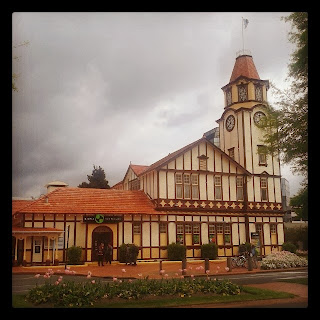I went by a seven-hour bus ride up north. On a beautiful sunny day, just like what I had when I went, that road trip was pretty fast. I was even given a treat to a scenic view of the snowcapped Mt. Ruapehu:
| Mt. Ruapehu: Cool blend of green, white and blue! |
The bus arrived at the Rotorua Tourism Center, which I would say is a wonderful gateway to the city. It gives you an impression of a laid-back, peaceful territory and that you're supposed to leave all your tensions and stresses right there and now. The tourism center used to be the Old Post Office. Connected to it is a memorial town clock erected in honor of the longest-serving prime minister of New Zealand, Richard Seddon.
 |
| Rotorua Tourism Center: Beautiful even in gray skies. |
Not far from this place is another building that truly made me feel I am in a different place and time. At first glance, I knew it was an old government building. Turns out, I am becoming good at identifying historic spaces here in New Zealand. It used to be the Old Bath House building within the Government Gardens before it was turned into the city's museum.
| Just arrived: I could really make use of the old baths here, really. |
The name Rotorua is actually a Maori word. Roto means "lake" and Rua means "two." It was the second major lake the Maori chief Ihenga discovered. Since the 1800s, Rotorua has been groomed as the "spa capital" of the country. Fair enough, they have heaps of hot pools around due to the geothermal activity of the city. Lake Rotorua, which is the second largest lake in the North Island, was formed from the crater of a large volcano.
| "Rotten-rua": This is one the volcanic vents that you can see (AND SMELL!) around the city. |
Speaking of lakes, Rotorua is known for having some of the most captivating lakes in New Zealand. And I had the grandest chance to check out two of those! So that's really roto-rua! The first one is called Lake Okareka, which means "the lake of sweet food." In early times, Maoris grew sweet potatoes (kumara) around the lake. It is now a residential area and I happened to be lodged in one of the houses around that beautiful body of water!
| Lake Okareka: Sweet Kiwi dip! |
Again, not so far from Lake Okareka is another breathtaking but bigger lake. Known for its striking color, especially on a bright sunny day, Lake Tikitapu is also known as Blue Lake. The Maori name comes from a story in older times wherein a daughter of a high-born chief was bathing in this lake and was wearing the Tikitapu (or the sacred greenstone neck ornament). The young woman happened to lose her precious stone in the blue waters of the lake. That tikitapu is believed to be still in the Blue Lake.
 |
| Blue Lake: Looks like deep blue sea! (Photo by Karlo Camacho, from his Facebook account) |
Today, Blue Lake is a preferred recreation and retreat center. It has benches around it, a playground for kids, a grill for barbecue, and fancy lodges. Some go for a swim and do other water activities such as kayaking.
 |
| Gray Lake?? (photo by Argie Reyes, from his Facebook account) |
On my way back to Wellington, I rode with a very loud and happy bunch of Filipinos. It was another six hours of beautiful and soothing scenery with original Pinoy music (OPM) playing on the background. My mind was brought back to the hustle and bustle of my home city in the Philippines. I imagined tall buildings, crowded streets, jam-packed jeepneys, smog, and the other inconveniences of a 'developing country.' If only I could take these 'privileges' with me so my fellow Filipinos can enjoy it too. But for the mean time, I quietly sat at the passenger seat, thankful and content, thinking about my next destination.
Sources:
On Lakes: http://www.rotoruanz.com/
On Rotorua Tourism Center: http://www.treklens.com/gallery/photo504480.htm